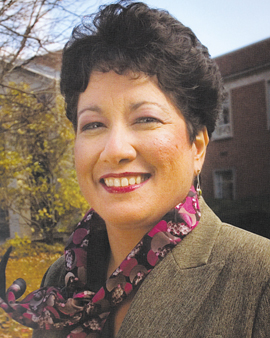
Health inequities are rampant in medicine. Our Office of Diversity, Equity & Inclusion is proud to be one of the only offices that includes and addresses sex and gender differences and women’s health. This focus and expertise derives from our legacy. As the first continuous female-only site in the U.S. where women could be trained to be physicians, our “College of Opportunity” has its feet rooted in sex and gender, and women’s health issues.
Today, sex and gender medicine and women’s health (SGM/WH) remains a young field of study, with its beginning only in the 1990s. Although we have some answers, the number of still unanswered questions is much larger. That’s where you come in! As a medical student at Drexel, you can engage in diverse activities to explore your questions, with help from mentors, faculty and others. The Women’s Health Education Program (WHEP) is an opportunity for Drexel medical students to delve into this field as part of their training.
Why Women’s Health?
Did you know?
- Women fear dying of breast cancer, yet more women die of heart disease than all cancer deaths.
- Rates of osteoporosis are higher in women versus men – why? We don’t yet know.
- One-third of female homicides in an emergency room are due to intimate partner violence.
- 20% of young women lose time from school due to dysmenorrhea (menstrual cramps).
- The rates of autoimmune disease are higher in women during their reproductive years; after this, rates become more comparable to men.
- Women have more debility from suboptimal pain management than their male counterparts.
- We also need to be more “granular” about which women we mean. Intersectionality is the multiple identities women (and men) have. For example, the rates of breast cancer are highest in white women but mortality is highest in black women. We still don’t yet know why.
- With certain diseases, it seems that if you are the 1 in a 10:1 ratio, your disease will likely be worse. For example, women get thyroid cancer at higher rates than men, but when men do get it, it presents as a more aggressive disease.
- The “typical” heart attack symptoms for women can be chest pain with exertion, shortness of breath and radiating arm pain – but it can also be jaw pain, diffuse chest discomfort, GI upset and, in the elderly, acute onset of severe exhaustion.
- The “world around” a female patient may different than a male – managing roles, family responsibilities can result in women putting off their own health care. Physicians need to understand gender-based sociocultural determinants of health.
Gender-based health disparities in disease manifestations, diagnosis, treatment and health outcomes continue to exist. We work at augmenting your educational experience in sex and gender medicine/women’s health at Drexel. WHEP was the first program in the country to include whole-person health (beyond reproduction) across four years of training. We have replicated our model to other medical schools and continue to work on new, innovative curricular techniques that result in translating new scientific findings and generating educational opportunities for our students.
From day one as a WHEP scholar, you can join us in activities, events and seminars. We serve as a resource for the diverse independent learning components to your education, and offer a tailored, mentored experience of your choosing in a topic in sex and gender medicine/women’s health. Through this program, you develop service leadership skills, practice audience-targeted communication strategies, and gain in-depth information useful to any specialty in the field of medicine that you might be interested in, all while creating a unique scholarly project. Our seminar series, a requirement for the Scholars track, discusses topics of interest in greater depth, in an interactive forum, using multi-disciplinary teams. The series is influenced by student interest, new research findings, and the expertise of our faculty, alumni and invited guest speakers.
Our office has many connections: to faculty locally, regionally and nationally and to community groups interested in health education and community outreach. We help to make connections so students have hands-on, impactful experiences. We work with students over their four years and have a senior advisory track or Pathway where students interested in any specialty are mentored, advised and able to create experiences tailored to their interests. Students receive individualized attention as we contribute to their success in attaining top-notch residencies. They then become tomorrow’s leaders and join the growing number of our Pathway alumni. Our program is a vibrant, interactive, relevant and responsive component to the educational experience at Drexel.
WHEP Accomplishments
Some of our “bragging rights”:
- First to include both non-reproductive and reproductive health across a medical school curriculum.
- First of three vanguards: DHHS, Office of Women’s Health, National Designated Centers of Excellence in Women’s Health.
- First to attain two Fund for Improvement in Post-Secondary Education grants (FIPSE) to forward sex and gender medicine and women’s health.
- Nationally recognized sex and gender medicine and women’s health educational leader.
- Nationally recognized expertise in cultural issues in care, and sex and gender medical education
Our diverse staff has expertise in clinical medicine, social justice activism, public policy advocacy, educational innovation, public health, statistical analysis, ethnographic research modalities,
community network development, student-focused services/counseling and minority health/ diversity science. The depth and breadth of their talents well support our mission. From students applying to our school who hear about our work, to those engaged in educational research, pathway programming or professional development, the Women's Health Education Program builds upon our historical legacy and focuses upon the development of the next generation of innovative leaders who will find the answers we need!
Ana E. Núñez, MD
Founding Director, Women's Health Education Program